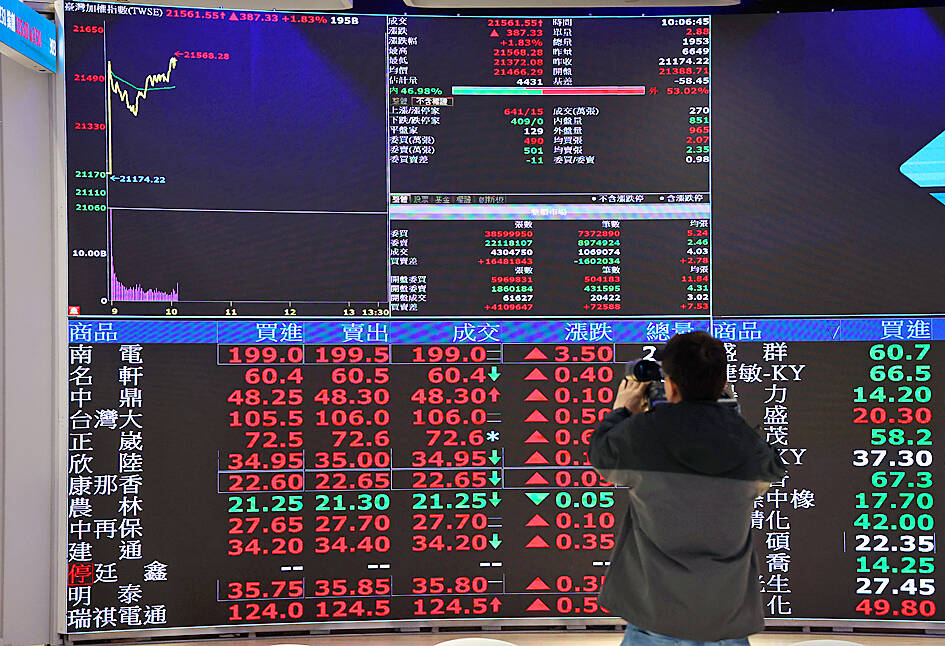Foreign funds snapped a two-month selling streak of Taiwanese equities last month amid renewed optimism around artificial intelligence (AI).
Overseas investors bought US$2.7 billion of Taiwanese shares, according to Bloomberg-compiled data.
That is a turnaround from when they sold stocks in March and April as Taiwan Semiconductor Manufacturing Co (TSMC, 台積電) cautioned over persistent weakness in consumer markets and funds rotated to rival South Korea.

Photo: CNA
Sentiment in chip stocks has recovered globally following another bullish forecast from AI chipmaker Nvidia Corp. Taiwan’s dominant position in the AI value chain would get another boost this week as tech giants gather for the nation’s annual electronics showcase event, Computex Taipei.
“Alongside Nvidia’s optimism, there was some cautious positioning on Taiwan earlier in the year which has eased,” Bloomberg Intelligence strategist Marvin Chen said. “While valuations are getting stretched, Taiwan is still Asia’s best proxy for the AI boom.”
Taiwan was the biggest recipient of foreign inflows last month among emerging Asian countries excluding China. That helped fuel a rally in TAIEX to a record high late last month and pushed the benchmark index to become one of the best performers in Asia this year.
Yesterday, the TAIEX moved sharply higher amid enthusiasm over AI development after a speech by Nvidia CEO Jensen Huang (黃仁勳) in Taipei a day earlier. The index closed up 362.54 points, or 1.71 percent, at 21,536.76.
TSMC, which is believed to provide advanced chips for Nvidia’s graphics processing units, led the gains throughout the session and closed 3.05 percent higher at NT$846.
Turnover on the main board totaled NT$433.32 billion (US$13.38 billion) yesterday, with foreign institutional investors buying a net NT$2.9 billion in shares, Taiwan Stock Exchange data showed.
There is still scope for global funds to keep buying given that foreign ownership of TSMC — the largest stock on the index with a weighting of 32 percent — is below the record 80 percent level seen in 2017.
A strong earnings outlook for Taiwanese firms also bodes well for foreign flows into the market. The 12-month forward profit estimate for the TAIEX has risen by more than 8 percent this year compared with little change on the MSCI Asia Pacific Index, data compiled by Bloomberg showed.
A delay in the US Federal Reserve’s rate cuts might still dent the tech rally, while any escalation in cross-strait tensions might deter foreign interest in Taiwan’s stock market.
“Strength of Nvidia and the underlying AI/server theme continue to support associated stocks in Taiwan,” Robeco Hong Kong Ltd Asia Pacific equities head Joshua Crabb said.
Stocks also remain attractive to foreign investors as they “are a lot cheaper than US counterparts,” he added.
Additional reporting by CNA

TARIFFS: The global ‘panic atmosphere remains strong,’ and foreign investors have continued to sell their holdings since the start of the year, the Ministry of Finance said The government yesterday authorized the activation of its NT$500 billion (US$15.15 billion) National Stabilization Fund (NSF) to prop up the local stock market after two days of sharp falls in reaction to US President Donald Trump’s new import tariffs. The Ministry of Finance said in a statement after the market close that the steering committee of the fund had been given the go-ahead to intervene in the market to bolster Taiwanese shares in a time of crisis. The fund has been authorized to use its assets “to carry out market stabilization tasks as appropriate to maintain the stability of Taiwan’s

STEEP DECLINE: Yesterday’s drop was the third-steepest in its history, the steepest being Monday’s drop in the wake of the tariff announcement on Wednesday last week Taiwanese stocks continued their heavy sell-off yesterday, as concerns over US tariffs and unwinding of leveraged bets weighed on the market. The benchmark TAIEX plunged 1,068.19 points, or 5.79 percent, to 17,391.76, notching the biggest drop among Asian peers as it hit a 15-month low. The decline came even after the government on late Tuesday authorized the NT$500 billion (US$15.2 billion) National Stabilization Fund (國安基金) to step in to buoy the market amid investors’ worries over tariffs imposed by US President Donald Trump. Yesterday’s decline was the third-steepest in its history, trailing only the declines of 2,065.87 points on Monday and

TARIFF CONCERNS: The chipmaker cited global uncertainty from US tariffs and a weakening economic outlook, but said its Singapore expansion remains on track Vanguard International Semiconductor Corp (世界先進), a foundry service provider specializing in producing power management and display driver chips, yesterday withdrew its full-year revenue projection of moderate growth for this year, as escalating US tariff tensions raised uncertainty and concern about a potential economic recession. The Hsinchu-based chipmaker in February said revenues this year would grow mildly from last year based on improving supply chain inventory levels and market demand. At the time, it also anticipated gradual quarter revenue growth. However, the US’ sweeping tariff policy has upended the industry’s supply chains and weakened economic prospects for the world economy, it said. “Now

An employment discrimination lawsuit against contract chipmaker Taiwan Semiconductor Manufacturing Co (TSMC, 台積電) might soon be expanded after a hearing in a federal court in San Jose, California, on Tuesday to add 15 plaintiffs to the case. According to a court document, the lawsuit, which was refiled in November last year as a form of a class action with 13 plaintiffs in California, wants to add 15 plaintiffs from Arizona, where TSMC is building up its wafer fab capacity. TSMC first committed between 2020 and last year to invest US$65 billion in three advanced wafer fabs in Arizona. It then pledged an